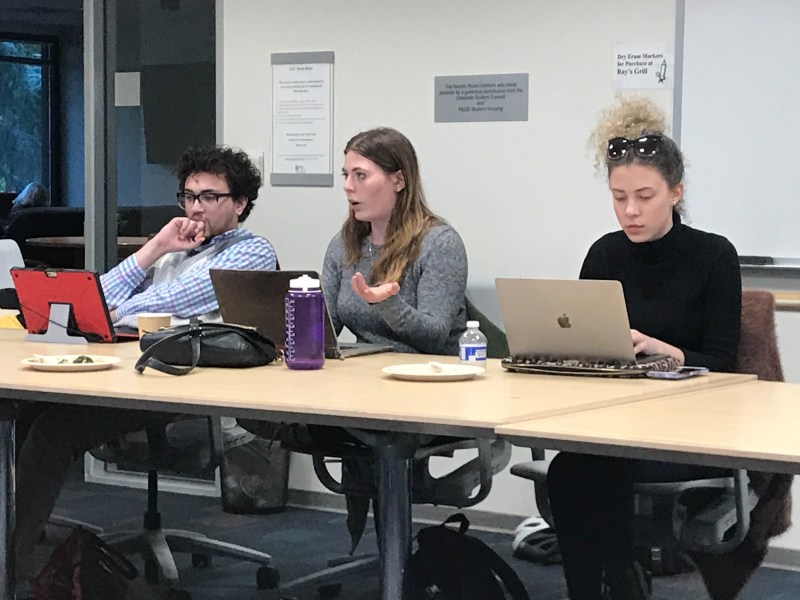A draft list of requests from the Graduate Student Council (GSC) regarding graduate student mental health was presented by GSC co-chair and cancer biology Ph.D. candidate Amy Tarangelo on Wednesday. Residential and Dining Enterprises (R&DE) also visited Wednesday’s meeting to discuss ongoing housing changes with the Council.
Mental Health requests
First, Tarangelo said, the GSC would ask for Stanford to “expand mental health access for graduate students” through the University’s Counseling and Psychological Services (CAPS). More funding for CAPS, she added, would allow the counseling center to attract more staff by offering a more competitive wage.
Tarangelo also proposed the GSC ask for more diverse providers at CAPS, with extended hours to account for different graduate students’ schedules.
One of the more ambitious goals, she said, would be the elimination of CAPS counselors’ unofficial limits on student visits before a given student is asked to go off campus for counseling. In regard to the “limits” set by different CAPS counselors, Tarangelo said, “There’s obviously an inconsistency.”
“There is no official limit, but in general CAPS only has the resources to be a short-term solution for most people,” said biophysics Ph.D. candidate and GSC funding committee co-chair Melanie Malinas, who formerly served on a CAPS advisory committee. “But there are some people who do go to CAPS long term depending on their insurance or their situation.”
“In general,” she added, “they do try to push you to an off-campus provider if they can.”
Tarangelo’s draft asks the University for CAPS infrastructure to “facilitate” the trend of students being directed off campus. She proposed CAPS keep a database of off-campus providers, including their identity and gender, their “style” of counseling and their location, as well as a feedback method for students to share their experiences at off-campus counselors with CAPS.
“People’s experiences tend to color how they think of CAPS more than anything else,” Tarangelo said.
She added that this would add “some accountability” for CAPS to avoid sending certain people based on the past experiences of similar individuals. A “referral coordinator” or other dedicated staff person, similar to that at Harvard, could follow up with students so they don’t “fall through the cracks,” Tarangelo said.
She added that the most ambitious potential request related to CAPS would be asking that it subsidize the cost of some off-campus counseling visits, such as the first 10, for each student.
In addition to the proposed requests of CAPS, Tarangelo suggested the GSC ask for “mandatory institution-wide training” for paid University faculty to handle mentorship and management in relation to students’ mental health. She said this would be similar to sexual harassment training.
She also proposed four weeks of vacation time be granted to graduate students each year — amounting to one week per quarter — as well as some kind of recourse for students who feel advisors are not following the rules.
Tarangelo suggested that such mentorship training could help faculty work more effectively with diverse students, including students with disabilities. The training would help faculty identify issues with advisees and better understand their role as a mentor, including their limits and resources in providing mental health aid.
Finally, Tarangelo proposed the GSC ask for increased funding for mental health resources outside of CAPS, such as The Bridge and a program for graduate students similar to the Peer Health Educators (PHEs) available in some undergraduate dorms.
“We could put that infrastructure in place right where students live and get to most of the graduate population,” Tarangelo said, noting that about 80 percent of graduate students will live on campus after the completion of Escondido Village graduate housing and the end of the subsidized off-campus housing program.
GSC will vote on a revised version of the list of asks that Tarangelo presented in the form of a resolution at next week’s meeting.
“I was happy to see a lot of the things in there are things the Affordability Task Force is going to recommend,” said GSC Social Chair and Division of Literatures, Cultures and Languages Ph.D. candidate Gabby Badica, following Tarangelo’s presentation.
R&DE updates
The housing assignment lottery for graduate students, which opens on Friday, will contain two new questions on roommate preferences this year, said Imogen Hinds, R&DE’s senior director of Student Housing Operations. The new questions will ask about each applicants’ gender identity and their feelings toward rooming with someone who lives with a support animal, she said.
The R&DE representatives, which also included Stanford Dining Director Eric Montell and R&DE spokesperson Jocelyn Breeland, clarified that Escondido Village, when completed, will replace the current subsidized off-campus housing program for graduate students. They will no longer be eligible for the subsidized off-campus housing program if they qualify for on-campus housing.
Although the rates at Escondido Village have not been confirmed, the R&DE representatives added, the pricing will likely be similar to that at the Kennedy Graduate Residences.
With regard to graduate student dining needs, Montell said it seemed like more graduate students ate at the Arrillaga Family Dining Commons (AFDC) over spring break. The AFDC opened over spring break for the first time last year, and it remains the only dining hall that is open during the break.
Badica advocated for AFDC, saying she thinks it would be preferable for the University to address food insecurity through subsidized meal swipes. She noted that the food at the dining halls is all-you-can-eat, and that kids eat free.
The amount of grad students that eat in the dining halls is “very unusual,” Montell said.
“You just don’t see it at other universities,” he added, prompting Badica to say that food at other universities is often “crappy.”
Contact Holden Foreman at hs4man21 ‘at’ stanford.edu.
